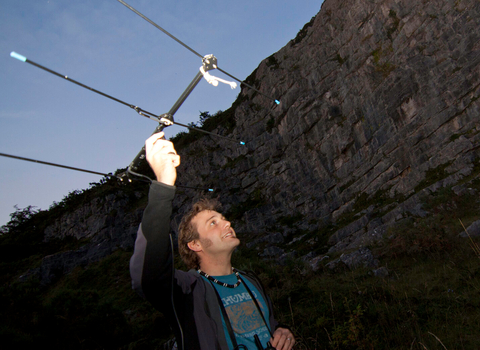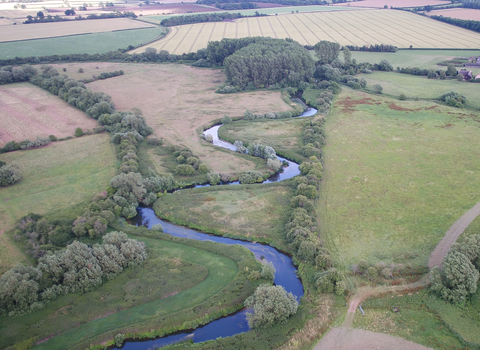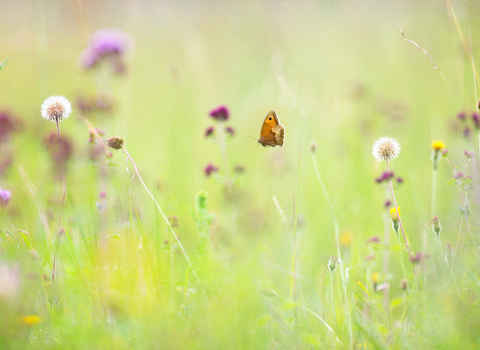Development solutions that deliver for nature
Biodiversity Net Gain (BNG) is a way of creating and improving natural habitats to ensure future residential and commercial development contributes towards nature’s recovery. Developers must ensure the land they use is left in a better condition for wildlife than before work started. If it isn’t, new better quality natural habitats must be created offsite.
In England, BNG became mandatory for all major developments from 12 February 2024 with regulation for small sites taking effect from 2 April 2024.
As part of the planning process and before a development begins, the biodiversity of the proposed site must be assessed and the impact of the development on it calculated, using the DEFRA Statutory biodiversity metric tools*.
Planning applications which do not deliver the minimum required increase in biodiversity onsite and satisfy the Trading Rules will be rejected unless they are able to achieve this through the creation of new habitats offsite which are listed on the Gain Site Register.
At BBOWT we are passionate to ensure BNG truly delivers for nature, in addition to existing environmental protection in the planning system. The priority will always be to avoid harming habitats.
The Environment Act says habitats created offsite need to be maintained for only 30 years. At BBOWT we believe they should be maintained and protected forever.
We want to see BNG regulation supporting nature’s recovery.
It cannot be just a compensation scheme for economic development, where the environment and local communities lose out.
We have over 60 years’ experience of creating, maintaining and protecting precious sites for nature, so we are perfectly placed to deliver BNG. Therefore, we have established our own habitat banks, using BNG to create amazing habitats which we can protect for generations to come.
What is BBOWT offering?
BBOWT is offering an end-to-end service that begins prior to development, advising on ways to assess and minimise environmental impacts on-site, through to creating and enhancing onsite resilient habitats for nature. We have proven experience and capability for delivering BNG offsite for landowners, whilst also providing offsite biodiversity units for developers from our own registered BNG Habitat Banks.
Nature’s recovery is at the heart of our work, so we will only work on projects where we believe they will truly benefit nature.

Bat survey. Photo by Tom Marshall
Future Nature Consultancy
BBOWT has an ecology consultancy, Future Nature WTC, which provides environmental services while ensuring the best outcomes for nature associated with development. These services include:
- Biodiversity Net Gain using the DEFRA metric
- Ecological Appraisals and Impact Assessments
- Habitat management, improvement and creation plans
- Advice on biodiversity offsets and habitat banking
- Protected Species survey
- Professional consultancy services

Aerial view of Duxford Old River and Chimney Meadows by Phill Pentecost AVP
BBOWT Habitat Banks
- Duxford Old River and Ludgershall Meadows were two of the earliest BNG Habitat Banks to be confirmed by Natural England onto the Gain Site Register in early 2024.
- BBOWT’s Habitat Banks provide registered offsite biodiversity units to Local Planning Authorities and developers who are looking to fulfil their BNG requirements and go above and beyond for nature.
- BBOWT agree biodiversity unit offsets for specific planning applications with developers and allocate these onto the Gain Site Register.
Our habitat banks are being designed and developed by our own team of ecologists and nature reserve managers, to create and enhance habitats and make new spaces for wildlife.
They are close to our existing nature reserves, creating more connected landscapes across our nature recovery network.
Sites will be managed by BBOWT not just for the 30-year mandatory period, but forever, leaving a real legacy for wildlife.
All income generated from BNG is being reinvested into the development and management of habitat banks across the three counties, ensuring that BNG is truly supporting nature’s recovery.
Contact us for more information at BNG@bbowt.org.uk
* The DEFRA metric is a way of assigning a numerical value by way of habitat units to the biodiversity on a site. Post-development the site must have 10% more units than pre-development. If it does not, the developer needs to create those units offsite, purchase biodiversity units from a habitat bank or through the statutory credit scheme. Only biodiversity units currently listed on the Gain Site Register can be allocated to planning applications. BNG: Search the biodiversity gain site register.

